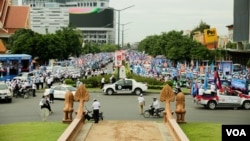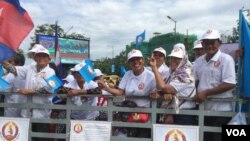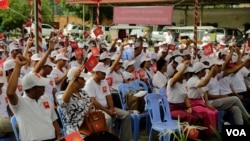Cambodian political parties began a three-week election campaign period on Saturday that saw Prime Minister Hun Sen make pledges to conduct reforms.
The campaigning got underway in the absence of the country’s main opposition party, which was banned by the Supreme Court late last year and will not be able to field any candidates to contest seats in the July 29 election.
Speaking to thousands of supporters in Phnom Penh, Hun Sen, the leader of the ruling Cambodian People’s Party, vowed to end political divides in the country and use development to bring Cambodians out of poverty.
“We must unite together to firmly protect peace, security, stability and public order, and vow to build our country into a more prosperous country, toward a vision that the country will have a high income by 2030,” he said, adding that he hoped Cambodia could become “the country with the highest income” by 2050.
He announced plans to reform the economy, democratic system, and law enforcement, as well as tax relief for small-scale farmers, subsidies for pregnant women on low incomes, and increased wages for private sector workers and civil servants.
Additionally, Hun Sen said the CPP would commit to improving infrastructures, such as roads and irrigation networks while expanding micro-finance services in rural areas and decreasing electricity prices.
“A vote for the Cambodian People’s party is a vote to continue restoring and enhancing the daily life of our people,” he said.
Ordinary Cambodians, however, had mixed views on the election campaign when asked by VOA Khmer, with some unaware that an election was taking place and others unhappy with the way the election had been organized.
Chiv Chansopheaktra, a CPP supporter, said Hun Sen and the party would “help us [Cambodians] have a decent living. The country is fine, so I don’t want to vote for another party. I only want to vote for him.”
Hun Sen has ruled Cambodia for more than 30 years, making him one of the longest-serving world leaders. Rights groups have long criticized Hun Sen’s rule as one defined by corruption, nepotism and the ever-present threat of violence, but the ruling party has dismissed the evidence against its leadership as “fake news” manufactured by conspiratorial western powers working with the former opposition to sow instability.
Hun Sen, a former Khmer Rouge commander who later sided with the Vietnamese forces to invade Cambodia and defeat the Khmer Rouge regime, has spent decades nurturing the image of Hun Sen the liberator, an image which Chansopheaktra and other CPP supporters still count as a major reason to vote for the ruling party.
“He has led us in a good way. On the other hand, my relatives died in the Pol Pot era. He [Hun Sen] liberated us and we are happy,” she said.
The CPP has been accused by international legal experts of blocking prosecutions of former regime officials at the Khmer Rouge tribunal, some of whom have been close political allies of Hun Sen and have served as senior government officials in Hun Sen-led governments.
So Vin, a monk who attended the CPP rally in Phnom Penh, said the election was not fair as the former opposition party, the Cambodia National Rescue Party, had been excluded from the ballot.
“The people taking part in the parades will be happy. But for me, I think not, because ... I want a proper competition,” he said, referring to the banning of the CNRP. “We have the rights, so others should have the same rights. We shouldn’t exercise our rights and suppress the rights of others.”
Some 20 political parties are contesting the election, which the CPP has said is evidence of pluralist democracy at work, while their critics have argued that the only opposition party that stood a chance of defeating the CPP was the CNRP, which previously held almost 45 percent of the seats in parliament.
Mao Monyvann, a CNRP politician, said it was a “shame” that the CPP had decided to erase all real opposition ahead of the election because it feared the will of the people.
“We’ve worked together since the 1990s and given our blood, sweat, and tears to push our country to have a real democracy that’s recognized by the world. Now democracy in our country has returned to the 1980s. It’s very shameful for our nation,” he said.
He added that Hun Sen should consider the negative reaction from foreign powers to credible allegations of a rigged election process, which he said would carry a “huge cost”.
Korn Savang, a monitoring coordinator of local election watchdog Confrel, which has withdrawn from monitoring the election, said the election campaign had so far been subdued compared with the run-up to the 2013 election.
“We used to see large parades between the Cambodian People’s Party and the former Cambodia National Rescue Party ... but large parades as we saw in 2013 and 2017 are not happening now,” he said.
The United States was accused by the Cambodian government of being behind a plot to overthrow Hun Sen after a video was circulated that showed the CNRP leader, Kem Sokha, recalling a meeting with U.S. officials where he said they had advised him to establish a human rights group to help gain traction among the people before going back into politics.
The CPP said this was evidence of a conspiracy and in September arrested Sokha, who remains in jail on treason charges along with several other political prisoners from the opposition and civil society. Washington and Brussels have both imposed limited sanctions on some Cambodian officials as a result, while Beijing has used the opportunity to move even closer to Hun Sen.









